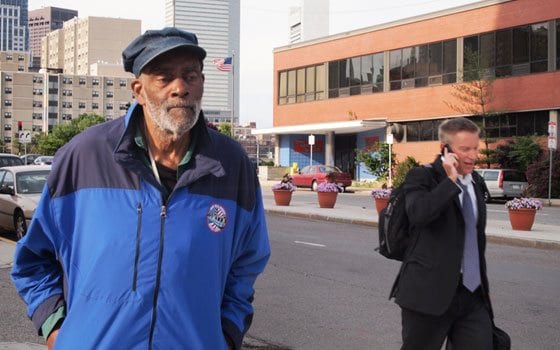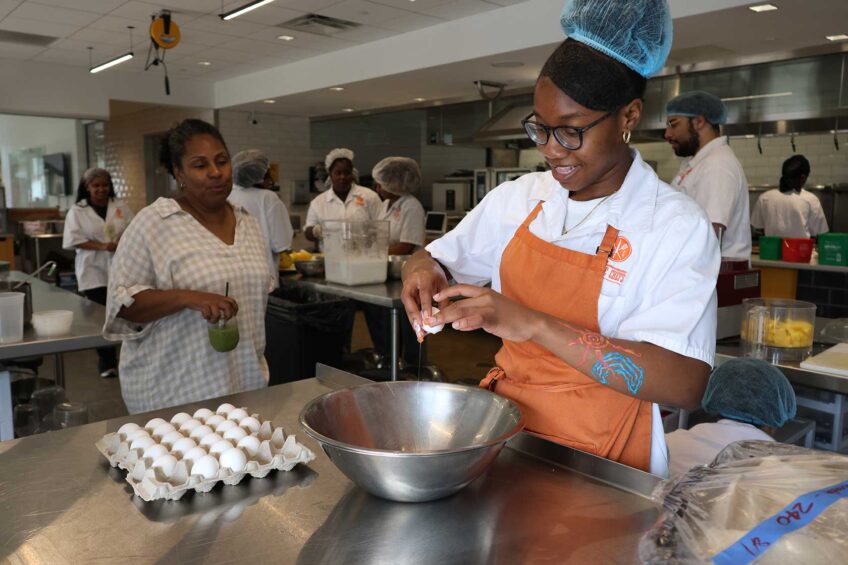Mel King was a visionary Boston leader
King left his mark on Boston with legacy of political activism

Outside the Concord Baptist Church in the South End on a warm October day in 1983, scores of Mel King’s supporters donned red tee shirts and signs supporting the then-state representative’s historic bid for the mayor’s office.
Inside the church — then a center of Boston’s Black community life — the Rev. Jesse Jackson came to rally a coalition of Black, Latino, Asian and progressive to maximize King’s vote in the November election against then state Rep. Ray Flynn.
Asked whether Boston was a racist city, Jackson responded that, like America, the City on a Hill has had its high moments and low moments.
“A low moment was Reagan winning Massachusetts,” Jackson told the reporters and King supporters in the church. “A high moment, Mel King becoming mayor next Tuesday.”
While King lost to Flynn, winning just a third of the city’s racially-polarized vote, his campaign itself served as a high water mark in the city’s progressive politics, setting the stage for future victories by candidates of color. By then, Jackson had already taken King’s concept of a Rainbow Coalition — the name he gave to the multi-ethnic base of voters King energized — and used it to brand the national political movement he formed while running for president, eventually taking along with the name several of King’s political operatives.
The 1983 campaign provided a window into King’s impact on the city and the nation. His Rainbow Party concept, honed by decades of coalition-building in Boston, captivated the imagination of people of color and progressives across the nation. Among those volunteering on his long-shot campaign to overturn the racialized political power structure of the city were many he’d mentored over the years in his various roles leading nonprofit agencies and grassroots movements.
While electoral victory eluded King, the undeniable his campaign prompted Mayor Ray Flynn to adopt many of the planks of his platform and assemble the most diverse City Hall workforce the city had ever seen.
King was born in Boston on Oct. 20, 1928 to Bajan and Guyanese parents and grew up in the New York Streets neighborhood of Boston. While King was attending Claflin College in South Carolina, his family wrote him a letter informing him that the Boston Redevelopment Authority was planning to level the South End enclave as part of its urban renewal slum clearance efforts. Speaking to the Banner in 2011, King described the multi-ethnic neighborhood as a vibrant community with Black, Armenian, Jewish and Italian-owned businesses.
The Record American, which merged with the Boston Herald, ran a series of articles describing the New York Streets area as a slum. After the city’s wrecking balls had leveled the area, the newspaper built its headquarters there on a 6.2-acre site it secured for $1.
“They called it Skid Row,” King said of the newspaper. “I learned something important from that: If they name you, they can claim you. If you let them define you in negative ways, they can devalue you.”
Returning to Boston, King began working as a community organizer at the Lincoln House, a settlement house in the Castle Square neighborhood of the South End. There, he helped residents there organize to fight the city’s urban renewal plans, helping them secure a new 500-unit low-income housing development on the site.
In later years, King helped residents in Chinatown fight displacement, organized protests that led to the development in 1980 of the mixed-income Tent City complex in Copley Square and helped push forward changes in the city’s development processes such as the parcel-to-parcel linkage program which assessed fees on major downtown projects that helped pay for affordable housing in the city’s residential neighborhoods.
In the process, King forged deep ties to Chinese American, Latino, Black and white neighborhood activists, ties that were later evidenced in the multi-ethnic composition of the Rainbow Coalition.
King’s first foray into politics was a 1965 campaign for School Committee. While his candidacy captivated the imagination of Black voters, many of whom were frustrated by the School Committee’s stubborn maintenance of a segregated school system where Black students were crowded into under-funded, outdated school buildings.
“The School Committee in Boston never acts so much as it is acted upon,” King wrote in a 1965 op-ed in the Banner. “A problem arises in the Boston schools and the Committee ducks. It figures that time is a great healer. If it doesn’t heal, they continue to sit tight anyway in a fatalistic stupor.”
As in many endeavors, King was ahead of his time in his ultimately unsuccessful run for a seat on the all at-large body. The city’s political landscape, long dominated by Irish- and Italian-American politicians, would prove largely impregnable for Black candidates, at least until the 1970s.
King remained active in the political sphere, winning a seat representing the South End-based 9th Suffolk District in the Legislature from 1973 until 1983. He was a founding member of the Massachusetts Legislative Black Caucus (Now the Black and Latino Caucus) and founded with John O’Bryant the Black Political Task Force, an organization which during the 1970s and ’80s helped galvanize activism in the community at a time of rapid expansion of Black and Latino political power.
Many of those who ran and won office during that time were mentored by King — including former state Reps Doris Bunte and Gloria Fox and former School Committee member John D. O’Bryant.
Through the decades, King took his training as a community organizer and applied it to his work — whether during his ten years in the state Legislature representing the 9th Suffolk District (1973-1983), as head of nonprofits such as the Harriet Tubman House, as an educator and as a community elder.
Working with diverse coalitions, King advanced a political agenda that prioritized affordable housing, writing legislation creating a law under which community development corporations are formed, and, as veteran community organizer Lew Finfer recalls, hosting a weekly breakfast in his South End brownstone for activists and officials working on housing issues.
“Staff of non-profits, city planners, planning students gathered each week to brainstorm ideas and Mel generously cooked the breakfast where the policy ideas were cooked too,” Finfer recalled in an email sent to news media Wednesday.
While much of King’s activism was locally focused, he stepped into the international sphere participating in protests of companies doing business with South Africa’s apartheid government in the 1970s and ’80s and authoring legislation in 1977 condemning the sale and advertisement of Krugerrands, which he said helped “finance the continuation of the policies of racism and apartheid” which “violate the basic human rights of all the people of South Africa.” Within ten years, the anti-apartheid boycott movement had swept college campuses, city councils and legislatures across the country, helping accelerate the downfall of white minority rule in South Africa in 1990.
In his opposition to apartheid, as was the case with so many of his visionary stands, King was ahead of his time. His rainbow coalition, one scoffed at by political insiders, become the winning formula for candidates from former Mayor Thomas Menino to U.S. Rep. Ayanna Pressley and Mayor Michelle Wu, all of whom depended on votes from Blacks, Latinos, Asians and progressive whites to win in Boston.







